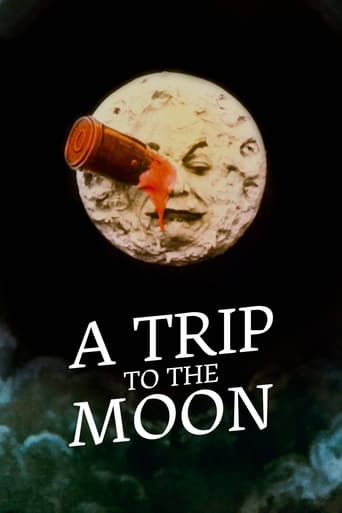grantss
A group of scientists build a rocket and fly to the Moon.Wonderfully imaginative and innovative. Directed by Georges Melies, a pioneer in the art and technology of film-making. Shot in 1902, when cinema was in its infancy, the movie shows cinema's theatrical roots, as well as the resourcefulness and ingenuity a pioneer like Melies possessed, and needed to possess. Clever set design, "special effects" and editing. Good plot with a great innocence and imagination to it all. It also gave us the iconic moon-with-a-rocket-in-its-face image.Such a landmark film in cinema history that it features heavily in Martin Scorsese's homage to cinema - 'Hugo' (2011).
cinephile-27690
I saw this thanks to Hugo(2011), and it is fantastic! Film would not exist without this movie, Meleies was indeed a great filmmaker-a fiend and me looked up some of his movies. One was of a woman preparing for a bath-it was the first "adult" film. This man MADE cinema for what it is today. All classic movies you can name? It's non-existent without this movie! Whether you like it or not, you have to appreciate it for that! It's only about 15 minutes long-why not see it now?
gian_99
We recently reached our first 100 years of cinema, and no one would dare say that cinema is not art. Yet, this movie was made back when cinema was, at most, a curiosity. A vulgar past time for the uncultured masses, at worst. I recently read a contemporary review of Dante's Inferno (1911, I believe), where the reviewer, a writer and culture woman, spelled this as clearly as this can be said (I translate from my memory): "We thought cinema was trash, but this was wonderful". With that attitude, it's no wonder early cinema was not carefully conserved. This movie was almost lost, and this would have been a great pity. This is a dreamy, wonderful hallucination. The story is told, and it's not seriously told. This movie does not take itself seriously, but it's meant to be funny, ironic, with a hint of some serious critique maybe (doesn't this space adventure remind you of colonialism a little bit?). The scientists are a funny lot, found of throwing science papers to each other's faces and surrounded with pretty assistants with naked legs (the relatively sexy attire of those assistants would have been a no-no until the 1970s in Italian TV). The Selenites are comic enemies. This movie has to be watched. It's entertaining and visually nice after 115 years. It sure is one of the first tries to use cinema in a new way to tell a story, and I believe later cinema (the already mentioned Dante movie included). It's a luck this was preserved and can be enjoyed today.
isadoradestri
The beginning of the 20th century and the idea of 'modern life' was being defined by the spread of technological revolution in the field of energy, transport and communication, and by new notions about the human mind, about time and space. People were being drawn in by innovation, by new technologies, by the desire of exploring the unknown. These desires were translated in George Méliès' 'Le Voyage Dans La Lune', and that - added to the fact that it was the first science fiction movie ever made, and the first film with a proper plot and storyline – was what made the film a tremendous success with the public. The story about a group of astronomers that travel to the moon in a rocket ship, explore its surface and return to earth with a captive lunar inhabitant fascinated the audience, for it was something never done before in entertainment history, and because it captured the spirit of innovation, of technological advance, and of discovery of the time.This is what made the film so relevant at that time, and what contributed to maintaining its relevance throughout the years. The fact that the movie has such great innovations and represents its time with such mastery is what makes it still worth watching. Nowadays, with the evolution of movies 'A Voyage to the Moon' might not be as appealing to audiences as it once was. But even so, it is a film that is still considerably watched and shown to film classes all across the world, and reinterpreted in many ways – for it was a pivotal point in entertainment development, and constituted the base to every new movie, clip or TV show that was to come. That is the reason why I enjoyed watching this film – not because it has great effects or plot, or is very compelling, but because it is– more than a simple piece of art – a piece of history. It represents the beginning of all film history. The same way historic events still have repercussions nowadays, so do movies. Everything we have ever watched and will ever watch started from that very one movie, was built on top of it, evolved from it. Even 110 years after its debut, it still has importance and influence, it is still discussed and studied – it still has meaning, even if we don't realize it. All those factors are what make this a must-see movie, a timeless, ageless one – a movie that has lasted a century and will last many more to come.





